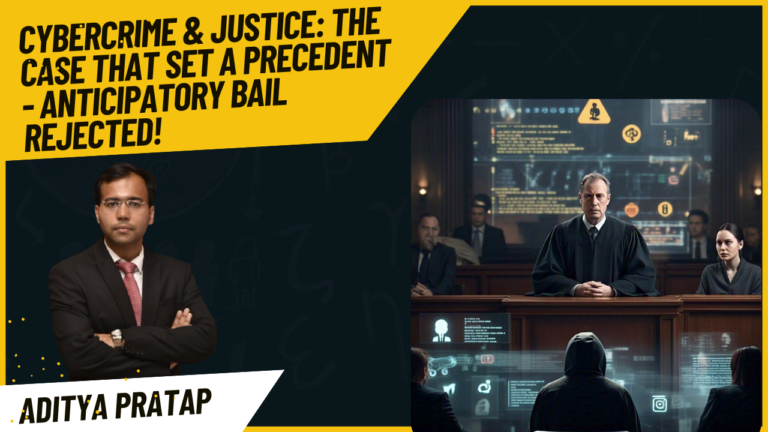
Rejection of Anticipatory Bail in Cybercrime and Harassment Cases
Courts have been increasingly denying anticipatory bail in cybercrime and harassment cases to balance individual rights with justice, emphasizing the gravity of technology-facilitated offenses. Such decisions ensure victim protection and prevent further misuse of technology.
A case deliberated in the Sessions Court, Dindoshi, Mumbai, highlights this approach. The applicant filed an anticipatory bail application under Section 438 of the Code of Criminal Procedure (Cr.P.C). The case involved severe accusations, including extortion, cyberstalking, defamation, and misuse of social media. Charges were registered under Sections 406, 354-C, 354-D, 384, 506, and 509 of the Indian Penal Code (IPC) and Sections 67-A and 66-E of the Information Technology Act, 2000.
Background of the Case
The intervener, a junior artist residing in Jogeshwari, Mumbai, alleged that the applicant exploited her trust, created fake social media accounts in her name, disseminated private photographs and videos, and extorted money. The court, presided over by Additional Sessions Judge V.V. Patil, rejected the anticipatory bail application on August 9, 2023.
This article examines the arguments presented by both sides and the court’s reasoning for its decision.
Arguments by the Applicant’s Advocate
The applicant’s counsel strongly defended against the allegations, asserting that they were baseless and motivated by ulterior motives. According to the applicant, the intervener borrowed approximately ₹20,00,000 under the pretense of starting a business in imitation jewelry. The applicant claimed that the complaint was filed to evade repayment of this amount.
The defense submitted that the applicant had earlier approached the police in March 2023 with allegations of financial fraud against the intervener. The counsel emphasized that the applicant cooperated with law enforcement, appearing for questioning, providing statements, and submitting his mobile phone for examination.
Furthermore, the defense argued that the accusations lacked credibility, noting inconsistencies in the intervener’s claims about fake social media accounts and threats. They contended that all materials had already been submitted, negating the need for custodial interrogation.
Counterarguments by the Prosecution and Intervener’s Advocate
The prosecution, represented by Additional Public Prosecutor, and the intervener’s advocate, Aditya Pratap, opposed the anticipatory bail application. They described the allegations as serious, involving harassment, manipulation, and cybercrime.
The intervener alleged that the applicant misused access to her social media accounts to create a fake Instagram profile, disseminate private content, and extort money. She also claimed that the applicant threatened to make the content viral to coerce her.
The prosecution highlighted the need for custodial interrogation to recover digital evidence and establish a chain of events. They argued that granting bail could lead to tampering with evidence and interference in the investigation.
Court’s Decision
Judge V.V. Patil rejected the anticipatory bail application, observing the seriousness of the allegations and the necessity of custodial interrogation to retrieve digital evidence. The judge emphasized that denying bail would safeguard the investigation process and protect the victim’s rights.
While the applicant’s cooperation was acknowledged, the court held that this did not eliminate the need for further investigation. The sensitive nature of cybercrime cases and their impact on the victim’s mental health were also noted.
The court concluded that anticipatory bail could not be granted if it obstructed justice or the investigative process, reinforcing the judiciary’s commitment to addressing cybercrime.
Conclusion
This case underscores the judiciary’s role in addressing the growing challenges of cybercrime. The rejection of anticipatory bail sends a strong message about prioritizing victims’ rights and ensuring a thorough investigation. As technology evolves, robust legal mechanisms are essential to combat cybercrime and safeguard individuals from online harassment and exploitation.

About the Author
Aditya Pratap is a practicing lawyer and founder of Aditya Pratap Law Offices based in Mumbai. An alumnus of NALSAR University of Law, Hyderabad, he has over 11 years of experience and has handled numerous cases of public and private significance. For more insights, you can visit his website: adityapratp.in. Watch him in TV interviews.